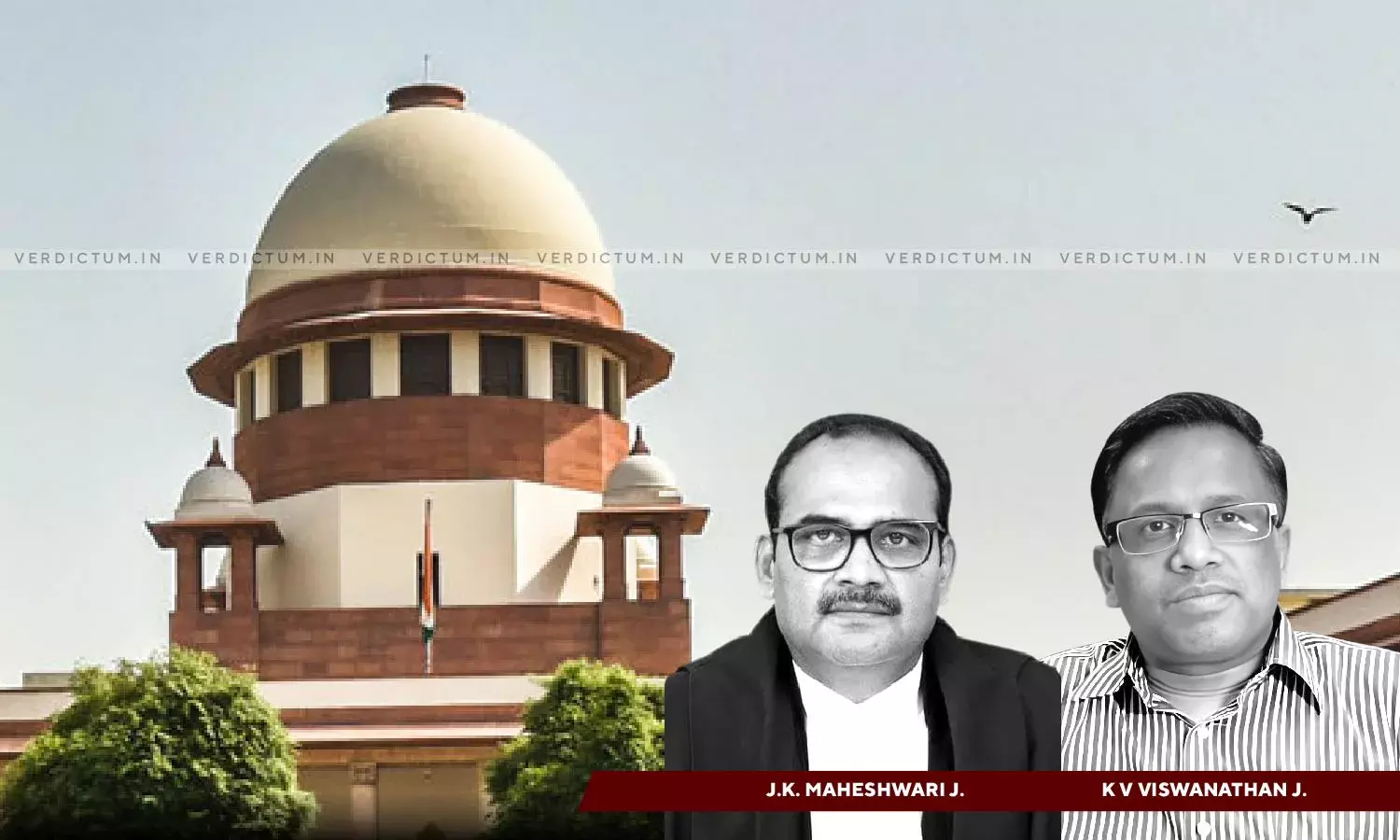If Findings Are Evidence-Based, Court Must Not Re-Appreciate & Arrive At Independent Finding: SC Reiterates About ‘Lakshman Rekha’

The Supreme Court has reiterated with regard to ‘Lakshman Rekha’ that if the findings are based on some evidence, the court must not re-appreciate the same and arrive at an independent finding.
The Court said this while dealing with a civil appeal filed by the State Bank of India (SBI) against the judgment of the Division Bench of Karnataka High Court whereby it dismissed the bank’s appeal and confirmed the judgment of the Single Judge who allowed the writ petition of the respondent and quashed the order of the Appointing Authority granting consequential benefits to him.
The two-Judge Bench of Justice J.K. Maheshwari and Justice K.V. Viswanathan observed, “It is now well settled that the scope of judicial review against a departmental enquiry proceeding is very limited. It is not in the nature of an appeal and a review on merits of the decision is not permissible. The scope of the enquiry is to examine whether the decision-making process is legitimate and to ensure that the findings are not bereft of any evidence. If the records reveal that the findings are based on some evidence, it is not the function of the court in a judicial review to re-appreciate the same and arrive at an independent finding on the evidence. This lakshman rekha has been recognized and reiterated in a long line of judgments of this Court.”
The Bench said that the Single Judge transgressed the limits of judicial review in setting aside the enquiry proceedings and the punishment imposed.
Advocate Sanjay Kapur appeared for the appellant/SBI while Senior Advocate S.N. Bhat appeared for the respondent.
Brief Facts -
Disciplinary proceedings were initiated against the respondent for certain acts of misconduct allegedly committed by him when he was working as Field Officer at one of the branches of SBI. It was alleged that he purchased an agricultural land in 1987 and got it registered in his name for a nominal amount using the influence of a man enjoying the credit facilities with the branch and he failed to declare to the bank, the purchase of immovable property as per the extant instructions.
Due to such acts, he placed himself under pecuniary objections to the party and the statement of imputations were furnished. The Appointing Authority had in 1995 imposed a punishment of “reduction in basic pay to the lowest stage in Scale-I” as envisaged under Rule 49 (e) of the State Bank of India (Supervising Staff) Service Rules and further, treated the period spent by the delinquent officer under suspension from 1990 till the date of his reinstatement as suspension only. SBI was before the Apex Court after being aggrieved by the High Court’s decision whereby it quashed the order of the appointing authority.
The Supreme Court in view of the above facts noted, “… we are constrained to conclude that the charge of the Bank, that the inspection was not carried, stood established. Then it was for the respondent to show, as undertaken by him, what his response to the allegation was. … In the present case, it could certainly not be said that the report is based on no evidence or that it is perverse.”
The Court held that it cannot sustain the orders passed by the Single Judge and the Division Bench.
“The Division Bench, in a short order has, after extracting a part of the learned Single Judge’s judgment, gone on to hold that having perused the records of the enquiry they do not find that the charges have been dealt with in any manner of specificity. Thereafter they conclude that the learned Single Judge was justified in arriving at its conclusion”, also noted the Court.
Furthermore, the Court observed that as per the settled law, if in a disciplinary proceeding, the order of penalty can be imposed on the charges proved and the punishment imposed is lawfully sustainable on those charges, it is not for the court to consider whether those grounds alone would have weighed with the authority in imposing the punishment.
“No doubt, on the facts of the present case, on some aspects of the charge the proof may have been found wanting. However, since the law laid down by this Court is that unless punishment imposed is only co-relatable to any of those charges found not proved, the penalty cannot be set aside. In this case, the punishment can be sustained even if the charges held not proved are severed”, added the Court.
The Court further held that the penalty as imposed is not disproportionate so as to shock the conscience of the court and hence, maintained the penalty as imposed in the order of the Appointing Authority and as confirmed by the Appellate Authority.
“… we have no hesitation in holding that both the learned Single Judge and the Division Bench were in error in allowing the writ petition and interfering with the findings of the Enquiry Officer, the decision of the Disciplinary Authority, the order of the Appointing Authority and the decision of the Appellate Authority”, concluded the Court.
Accordingly, the Apex Court allowed the appeal and set aside the judgment of the High Court.
Cause Title- State Bank of India v. A.G.D. Reddy (Neutral Citation: 2023 INSC 766)


